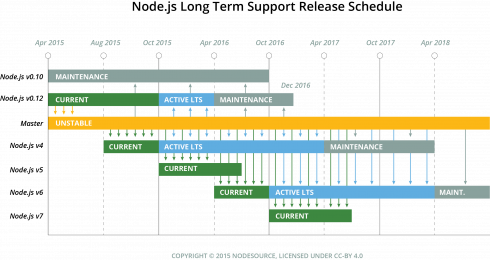
The Node.js Foundation has announced Node.js 11 is moving up to the current release line as of this week. As part of this announcement, Node.j 10.x will more to Long Term Support status by the end of the month.
“When Node.js 10.x becomes the latest LTS version, it is ready to be used in production and by applications that need to scale,” the foundation wrote in a post.
According to the foundation, the new updates are focused on performance, security, integration of newer JavaScript features, tracing and diagnostics, the organization said, and follow the new release structure of Node.js which sees even-numbered releases enter LTS while odd-numbered releases get the latest features more quickly.
Some of the new features in Node.js 10 include:
- HTTP/2 support, providing a 10x performance boost over HTTP 1.1 through better HTTP header compression, the foundation wrote
- V8 6.8 support for improved WebAssembly execution speed
- npm 6.4 support for more stable and secure JavaScript package installations with better performance
Additionally, the Node.js 10.x features experimental inclusions, including:
- “Workers API: Every worker has its own event loop — similar to what folks experience in the browser; this can also lead to more detailed debugging of workers.
- Top level await in REPL: This will allow you to just run Node.js in your terminal.
- fs Promises API: This is a useful feature as it allows you to receive promises vs. callbacks.
- NodeChakra released with Time Travel Debugging.
- AsyncIterators support on Node.js Readable Streams.”
While the new features in Node.js 11 aren’t ready to be tested in production, the foundation wrote, developers will be able to test the release’s ability to reschedule interval timers even if the previous interval produced an error. Additionally, version 11 no longer supports FreeBSD 10. The full changelog is available here.






